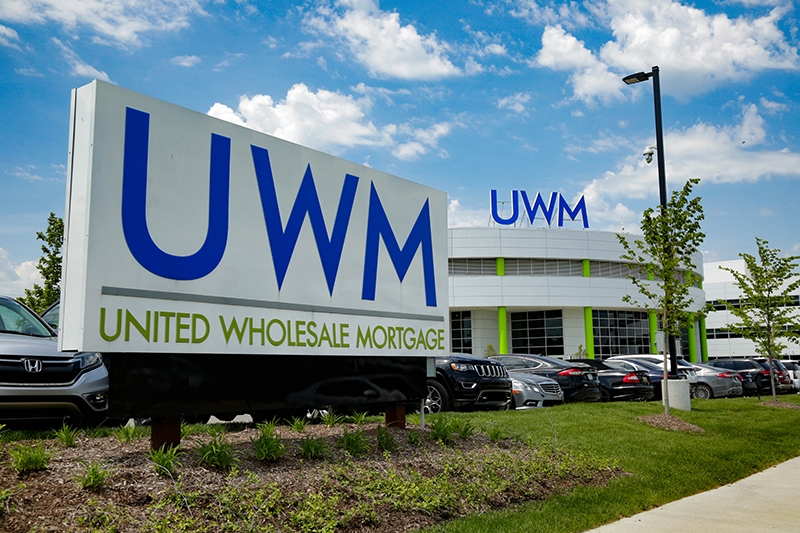
UWM Expands Non-QM Loan Program

Analyst says expansion of Bank Statement Loan Program just another way to serve the market.
United Wholesale Mortgage announced this week it is expanding its Bank Statement Loan programs.
The Pontiac, Mich.-based lender said Wednesday in a news release that the intent of the expanded Bank Statement Loan program is “to provide additional flexibility for independent mortgage brokers and self-employed borrowers.”
It continued, “The expanded product offerings give brokers increased transparency into investor guidelines and borrower qualifications, helping them to find the right option for their self-employed clients.”
Using bank statements — instead of pay stubs, W2 forms, or income tax returns — to qualify borrowers defines the loan as a non-qualified (Non-QM) mortgage. A Non-QM loan is not required to meet agency-standard documentation requirements, as set by the Consumer Financial Protection Bureau (CFPB).
They are also considered a greater risk because they are not backed by Fannie Mae or Freddie Mac, and come with higher interest rates.
UWM first announced its bank statement loan program in March 2022, offering just one option. A company spokesperson said Thursday that this week’s announcement includes updating that one option while adding three more.
The programs are color “coded” — called Bank Statement Blue, Bank Statement Yellow, Bank Statement Pink, and Bank Statement Orange. Each has slightly different requirements for qualifying. You can view the options here.
“With these products, [borrowers] can provide bank statements to verify income instead of tax returns, W2s, or pay stubs to qualify for loans up to $3 million, with LTVs (loan-to-value ratios) up to 90% and no mortgage insurance required,” UWM said.
2 Straight Quarterly Losses
Last month, UWM Holdings Corp., the publicly traded parent of UWM, reported its second-consecutive quarterly loss as the value of its mortgage servicing rights (MSRs) sharply declined, and revenue and loan origination volume fell.
The Pontiac, Mich.-based company reported a net loss in the first quarter of $138.6 million, or 13 cents per diluted share, more than double the net loss of $62.5 million, or 3 cents per diluted share, it reported in the fourth quarter of last year.
A year earlier, UWM reported net income of $453.3 million, or 22 cents per diluted share.
UWM reported a significant drop in overall loan originations, which fell to $22.23 billion in the first quarter, down 11.2% from $25.1 billion in the fourth quarter and down nearly 43% from $38.8 billion a year earlier.
Despite the massive drop in originations, UWM remained the top overall mortgage lender in the nation.
Shampa Bhattacharya, a UWM analyst for Fitch Ratings, said it’s not surprising that lenders are trying to “add products to their toolkit” to bring in additional originations.
“Originations are down … let’s say 60% cumulative over the last two years,” she said. “I wouldn’t necessarily call it ‘desperation.’ Originators are trying to serve the market where it is.”
Bhattacharya said UWM and other companies are primarily conventional, conforming lenders.
“Up to 95, 96, 97% of what they originate are conventional, conforming loans that they sell to the GSEs,” she said. “If they are doing or allowing a little bit of jumbo or Non-QM products, it’s to motivate the brokers. To maintain these brokers as customers they have to offer them other ways to facilitate loans.”
Watching Closely
That doesn’t mean analysts aren’t watching closely to see how these loans affect the company’s bottom line, she said.
Because Non-QM loans can’t be sold off like conventional loans, “It will become concerning if we see this product growing on the balance sheet,” Bhattacharya said. “UWM is keeping all of the credit risk for the life of the loan. So if they are a bigger part of the balance sheet, it could be a concern.”
As she noted, however, this is not a major change in UWM’s business strategy, so it is unlikely that Non-QM will become a bigger part of the company’s business which could affect its credit quality.”
“If it becomes a credit quality issue, then we’d be more concerned and pay more attention to it,” she said.
Analysts also acknowledge the cyclical nature of the mortgage industry, she said, which is why the consecutive quarterly losses have not yet raised alarm bells. As long as a company is “taking the right actions to ensure you are profitable in the long term, and not bleeding cash or destroying equity,” analysts won’t be overly concerned about an individual quarter’s results.
She noted that Fitch has UWM rated with a stable outlook.
Bhattacharya also said the second quarter has shown more strength in the housing market than was seen in the previous two quarters. “That, probably by just definition, means we might have seen the bottom of the cycle,” she said.
“Things can turn back down again,” she continued, “but it looks like we might have seen the bottom already.”
She added, “Our expectation is [UWM][ will have to show profitably in the long term, … but we’re not concerned.”




